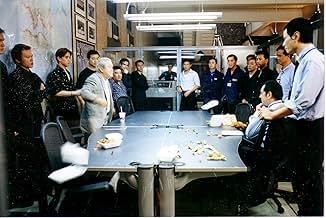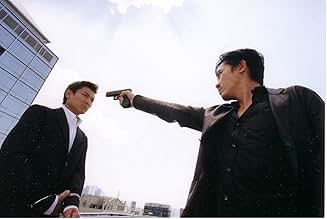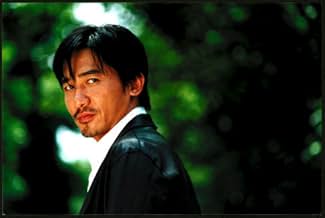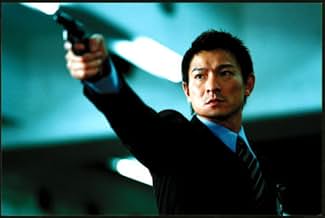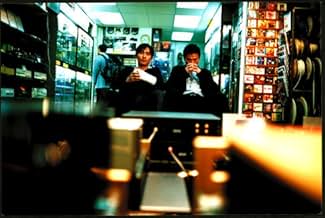Une histoire entre une taupe dans la police et un flic infiltré. Leurs objectifs sont identiques : découvrir qui est la taupe et qui est le flic.Une histoire entre une taupe dans la police et un flic infiltré. Leurs objectifs sont identiques : découvrir qui est la taupe et qui est le flic.Une histoire entre une taupe dans la police et un flic infiltré. Leurs objectifs sont identiques : découvrir qui est la taupe et qui est le flic.
- Réalisation
- Scénario
- Casting principal
- Récompenses
- 24 victoires et 26 nominations au total
Tony Leung Chiu-wai
- Chen Wing Yan
- (as Tony Leung)
Anthony Chau-Sang Wong
- SP Wong Chi Shing
- (as Anthony Wong)
Ka-Tung Lam
- Inspector B
- (as Lam Ka Tung)
Ting Yip Ng
- Inspector Cheung
- (as Ng Ting Yip)
Chi-Keung Wan
- Officer Leung
- (as Wan Chi Keung)
Kam Fung Hui
- Cadet School Principal
- (as Hui Kam Fung)
Avis à la une
Beautifully shot, cleverly constructed, humorous, dramatic, and humane. I never felt bored or rushed for a moment. Expect to have to concentrate on who is who, especially at the beginning, who is or might be on to whom and how, and what they might decide to do about it. Others have said that the two leads are excellent and I'm sure they're right, but I especially appreciated Eric Tsang as Sam.
It's elegant without being heartless. I felt the main characters' longing for truth in their lives, and the various different virtues, flaws, loyalties and motivations of many others too.
I was interested to see that virtually all the violence happens off-camera. It reminded me of 'authentic' productions of Classical Greek plays. Their plots often included murders, but violence was not permitted to be shown directly. A character would describe what had happened, and then a tableau of corpses would be revealed, on a wheeled wheels if I remember correctly from one production. Almost the same device is used in this film, and it's very effective when it's done well, as here.
The friend I went with would have liked to the female characters given bigger roles. Personally (I'm a woman myself, if it makes a difference) I don't care about that. I did notice, though, the way the female characters were used as symbols to represent the good and truthful side of life. It struck me, in connection with this, that sex and violence were being treated as opposites, whereas in many US films they are treated almost as two aspects of the same thing and as depending on one another, hardly existing independently. How many plots are driven by the kidnapping or other ill-treatment of the hero's wife/girlfriend/squeeze, so that the violence against her - whether she resists it violently or not - is used to justify and supposedly motivate the whole towering nonsense by virtue of her sexual relationship with the hero? It often seems that the villian's real offence is thought to be less assault on a person, than theft of property. And I wonder if, when the US remake appears, this tedious plot device will have crept in? But I digress - it was just an idea that occurred to me on the way home, and it tells you little about "Infernal Affairs", except that it may be one reason why I found this film refreshing.
An absorbing experience, and has made me more inclined to seek out Asian films in general, as well as films by the same director.
It's elegant without being heartless. I felt the main characters' longing for truth in their lives, and the various different virtues, flaws, loyalties and motivations of many others too.
I was interested to see that virtually all the violence happens off-camera. It reminded me of 'authentic' productions of Classical Greek plays. Their plots often included murders, but violence was not permitted to be shown directly. A character would describe what had happened, and then a tableau of corpses would be revealed, on a wheeled wheels if I remember correctly from one production. Almost the same device is used in this film, and it's very effective when it's done well, as here.
The friend I went with would have liked to the female characters given bigger roles. Personally (I'm a woman myself, if it makes a difference) I don't care about that. I did notice, though, the way the female characters were used as symbols to represent the good and truthful side of life. It struck me, in connection with this, that sex and violence were being treated as opposites, whereas in many US films they are treated almost as two aspects of the same thing and as depending on one another, hardly existing independently. How many plots are driven by the kidnapping or other ill-treatment of the hero's wife/girlfriend/squeeze, so that the violence against her - whether she resists it violently or not - is used to justify and supposedly motivate the whole towering nonsense by virtue of her sexual relationship with the hero? It often seems that the villian's real offence is thought to be less assault on a person, than theft of property. And I wonder if, when the US remake appears, this tedious plot device will have crept in? But I digress - it was just an idea that occurred to me on the way home, and it tells you little about "Infernal Affairs", except that it may be one reason why I found this film refreshing.
An absorbing experience, and has made me more inclined to seek out Asian films in general, as well as films by the same director.
I looked over a squad of reviews and was sad not to see anyone writing from Hong Kong. So I am putting in my piece.
Hong Kong movies have changed a lot in the last decade and when Infernal Affairs came out it was a real change. I noted 'Golden Chicken' was mentioned earlier, and that sums up many of the lame comedies that have recently been churned out. However the comedy is a large part of Hong Kong cinema, as is the gangster genre.
Infernal Affairs breaks with the comedy, keeps the gangsters (lau being a first class clean cut one - whilst Leung acts a remarkable strained police officer) and adds clever and intelligent tension. The acting is first class, as is the mood that truly captures the zeitgeist.
This movie is about the two characters and their similarities and moral obstacles. It also has something subtle to say.
This film was huge news in Hong Kong and the mainland. It is an important Hong Kong film.
The US remake will be more clichéd than you can imagine. This film will translate, it is not that original, no. But it has substance and mood that is valuable.
See it.
Hong Kong movies have changed a lot in the last decade and when Infernal Affairs came out it was a real change. I noted 'Golden Chicken' was mentioned earlier, and that sums up many of the lame comedies that have recently been churned out. However the comedy is a large part of Hong Kong cinema, as is the gangster genre.
Infernal Affairs breaks with the comedy, keeps the gangsters (lau being a first class clean cut one - whilst Leung acts a remarkable strained police officer) and adds clever and intelligent tension. The acting is first class, as is the mood that truly captures the zeitgeist.
This movie is about the two characters and their similarities and moral obstacles. It also has something subtle to say.
This film was huge news in Hong Kong and the mainland. It is an important Hong Kong film.
The US remake will be more clichéd than you can imagine. This film will translate, it is not that original, no. But it has substance and mood that is valuable.
See it.
Martin Scorsese's 'The Departed' was probably one of the most critically-acclaimed films of 2006, and, upon hearing the tumult of praise that accompanied its release, it was a film that I desperately wanted to see. However, I couldn't do so until I had seen the 2002 Hong Kong film upon which it was based, 'Mou gaan dou {Infernal Affairs},' directed by Wai-keung Lau and Siu Fai Mak. Fortunately, not too long ago, my local movie rental store was having a sale on their superfluous VHS tapes, at a price of $2.00 apiece. Among the cheap movies that I snapped up was a copy of 'Infernal Affairs' that looked like it had never been opened. Having now watched it, I must say that, despite my limited experience with Asian cinema, I very much enjoyed the film. 'Infernal Affairs' combines an irresistible story of intrigue, loyalty and betrayal with some extremely slick editing and camera-work; it's no surprise that the film has acquired an impressive following in the West.
Tony Leung plays Chan Wing Yan, an overwrought undercover cop who has spent the last ten years infiltrating numerous dangerous gangs and exposing their criminal dealings. On the opposite end of the spectrum, Andy Lau plays Inspector Lau Kin Ming, a police mole who is secretly working the Triad, the same gang with which Yan is currently affiliated. After an expensive drugs transaction goes wrong for both the gang and the police force, each side suspects that they have a traitor in their midst, and, in a bitterly ironic turn, it falls to each of the two moles to find out who it is. Both main actors do a good job of maintaining the intensity of the story. There are certainly countless parallels to be drawn between the characters, but what struck me most were the contrasts between the two: Ming is a cold, devoted and ruthlessly efficient, whilst Yan has been reduced to a tired and neurotic wreck after a decade of living in fear.
The plot of 'Infernal Affairs' moves forward at a ripper pace, probably owing more to Western action cinema than that from its own region. The cinematography is bright and stylish, and the climactic scene on the rooftop, with the vibrant sunlight beaming overhead, was captured to great effect {Australian-born Christopher Doyle, who has worked on such films as '2046' and 'Rabbit-Proof Fence,' contributed to this film, so you already know that the cinematography will be good}. There are several moments when the storytelling was not handled as well as it might have been: the film made too frequent use of unnecessary flashbacks, and, following the death of Superintendent Wong (Anthony Wong), we are treated to a video montage that feels like the final episode of a long-running sitcom. Also, the failed attempts of Ming's wife to finish her novel ("I don't know whether he's good or bad") was a blatantly-obvious attempt to draw parallels with Andy Lau's character. Despite my trivial complaints, 'Infernal Affairs' is an entertaining and thrilling film that I'd certainly recommend to anyone.
Tony Leung plays Chan Wing Yan, an overwrought undercover cop who has spent the last ten years infiltrating numerous dangerous gangs and exposing their criminal dealings. On the opposite end of the spectrum, Andy Lau plays Inspector Lau Kin Ming, a police mole who is secretly working the Triad, the same gang with which Yan is currently affiliated. After an expensive drugs transaction goes wrong for both the gang and the police force, each side suspects that they have a traitor in their midst, and, in a bitterly ironic turn, it falls to each of the two moles to find out who it is. Both main actors do a good job of maintaining the intensity of the story. There are certainly countless parallels to be drawn between the characters, but what struck me most were the contrasts between the two: Ming is a cold, devoted and ruthlessly efficient, whilst Yan has been reduced to a tired and neurotic wreck after a decade of living in fear.
The plot of 'Infernal Affairs' moves forward at a ripper pace, probably owing more to Western action cinema than that from its own region. The cinematography is bright and stylish, and the climactic scene on the rooftop, with the vibrant sunlight beaming overhead, was captured to great effect {Australian-born Christopher Doyle, who has worked on such films as '2046' and 'Rabbit-Proof Fence,' contributed to this film, so you already know that the cinematography will be good}. There are several moments when the storytelling was not handled as well as it might have been: the film made too frequent use of unnecessary flashbacks, and, following the death of Superintendent Wong (Anthony Wong), we are treated to a video montage that feels like the final episode of a long-running sitcom. Also, the failed attempts of Ming's wife to finish her novel ("I don't know whether he's good or bad") was a blatantly-obvious attempt to draw parallels with Andy Lau's character. Despite my trivial complaints, 'Infernal Affairs' is an entertaining and thrilling film that I'd certainly recommend to anyone.
After I enjoyed Martin Scorcese's "The Departed, I decided to watch the film that inspired the celebrated director to re-make it and move the action from Hong Kong to Boston, MA, USA. I must say that I liked the original movie better: 50 minutes shorter than Scorcese's magnificent remake, "Infernal Affairs" is tighter, faster, more compelling and tells the same story better. It does not have a grand acting Jack Nicholson who basically plays Daryl Van Horne with the attitude and "Infernal Affairs" characters don't talk and don't curse as much as they do in "The Departed" but the Hong Kong's movie only benefits from it. As much as I admire Leonardo DiCaprio as Bill Castigan, Tony Leung (Yan) in his role is simply unforgettable.
I'm late in discovering the Hong Kong crime thriller genre so I can only compare "Infernal Affairs (Mou gaan dou))" to its Hollywood compatriots. It grippingly is the equal of such intense examinations of the anguish of undercover cops as "Donnie Brascoe" or dirty cops such as "Narc" or "Training Day."
Key is the dynamic opposite pairing of two leonine, charismatic actors, Tony Leung Chiu Wai, the self-sacrificing heart throb from "Hero (Ying xiong)" and the languid lover from "In the Mood for Love (Fa yeung nin wa)" here as an antsy, anguished too long undercover cop versus Andy Lau as his crisply efficient, ambitious counterpart.
The plot, propelled as well by the music, unpredictably twists and takes hairpin turns from the beginning so that even with helpful flashbacks it's a thrilling roller coaster ride to try to follow the constantly changing loyalties, manipulations, deals and revelations, not unlike the TV series "The Wire."
Regardless, you get that the real battle is for the characters' souls as much as their lives and you hold your breath to the last surprising minute. The initial motivations for how the men came to be at this crossroads will doubtless be explored in the prequel and sequel that haven't been released in the U.S. yet.
The women are just the girlfriends, but they do have separate lives, jobs and choices that impact the men in their lives.
With noted cinematographer Christopher Doyle is listed as a "visual consultant" in the credits, the great bulk of the film takes place at night, like a comparable chase film "Collateral," so it was unfortunate that the print I saw was not pristine.
It was also annoying that the subtitles were white on white illegible and that ideograms that are shown in the scene are not translated, even when the camera rests on them for a length of time that makes one assume something significant is written there.
Key is the dynamic opposite pairing of two leonine, charismatic actors, Tony Leung Chiu Wai, the self-sacrificing heart throb from "Hero (Ying xiong)" and the languid lover from "In the Mood for Love (Fa yeung nin wa)" here as an antsy, anguished too long undercover cop versus Andy Lau as his crisply efficient, ambitious counterpart.
The plot, propelled as well by the music, unpredictably twists and takes hairpin turns from the beginning so that even with helpful flashbacks it's a thrilling roller coaster ride to try to follow the constantly changing loyalties, manipulations, deals and revelations, not unlike the TV series "The Wire."
Regardless, you get that the real battle is for the characters' souls as much as their lives and you hold your breath to the last surprising minute. The initial motivations for how the men came to be at this crossroads will doubtless be explored in the prequel and sequel that haven't been released in the U.S. yet.
The women are just the girlfriends, but they do have separate lives, jobs and choices that impact the men in their lives.
With noted cinematographer Christopher Doyle is listed as a "visual consultant" in the credits, the great bulk of the film takes place at night, like a comparable chase film "Collateral," so it was unfortunate that the print I saw was not pristine.
It was also annoying that the subtitles were white on white illegible and that ideograms that are shown in the scene are not translated, even when the camera rests on them for a length of time that makes one assume something significant is written there.
Le saviez-vous
- AnecdotesWhen Yan and SP Wong are waiting at the elevator, the digital floor counter skips the 4th floor. In China and Hong Kong, the number 4 is considered bad luck because it sounds similar to the word 'death'.
- GaffesShawn Yue (Young Chen Wing Yan) is taller than Anthony Chau-Sang Wong (SP Wong Chi Shing), and there is a brief shot of them standing together. Tony Chiu-Wai Leung (Chen Wing Yan) is clearly shorter than Anthony Chau-Sang Wong, so the character has apparently shrunken.
- Citations
Lau Kin Ming: I have no choice before, but now I want to turn over a new leaf.
Chan Wing Yan: Good. Try telling that to the judge; see what he has to say.
Lau Kin Ming: You want me dead?
Chan Wing Yan: Sorry, I'm a cop
Lau Kin Ming: Who knows that?
- Versions alternativesFor the Chinese version an alternate ("politically correct") ending was used. In it, Lau gets arrested when he leaves the elevator.
- ConnexionsEdited into Infernal Affairs III (2003)
- Bandes originalesInfernal Affairs
Composed & Arranged by Ronald Ng
Performed by Andy Lau and Tony Leung Chiu-wai (as Tony Leung)
Produced by Ronald Ng and Kwok-Leung Chan
O.P. BMG Music Publishing Hong Kong, Ltd./Catchy Music Publishing, Ltd.
Meilleurs choix
Connectez-vous pour évaluer et suivre la liste de favoris afin de recevoir des recommandations personnalisées
Détails
- Date de sortie
- Pays d’origine
- Sites officiels
- Langues
- Aussi connu sous le nom de
- Vô Gian Đạo
- Lieux de tournage
- Ten Thousand Buddhas Monastery, Sha Tin, New Territories, Hong Kong, Chine(opening scene: temple)
- Sociétés de production
- Voir plus de crédits d'entreprise sur IMDbPro
Box-office
- Budget
- 6 428 966 $US (estimé)
- Montant brut aux États-Unis et au Canada
- 169 659 $US
- Week-end de sortie aux États-Unis et au Canada
- 25 680 $US
- 26 sept. 2004
- Montant brut mondial
- 8 836 958 $US
- Durée
- 1h 41min(101 min)
- Couleur
- Mixage
- Rapport de forme
- 2.35 : 1
Contribuer à cette page
Suggérer une modification ou ajouter du contenu manquant





